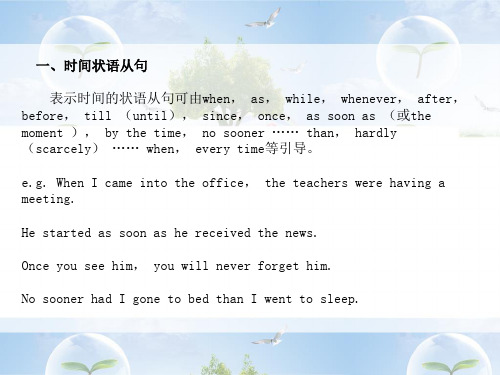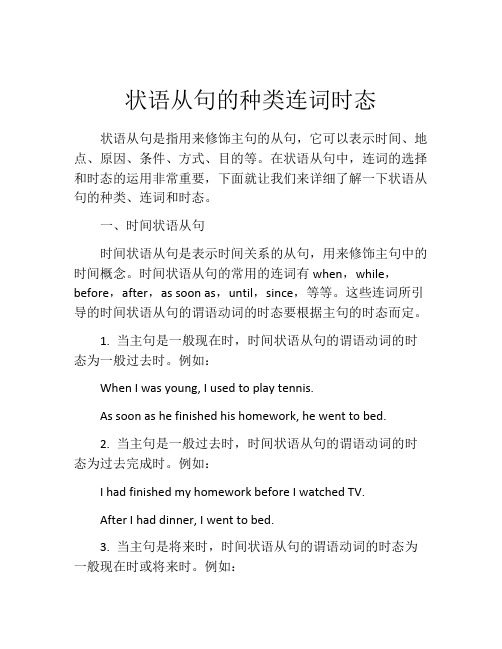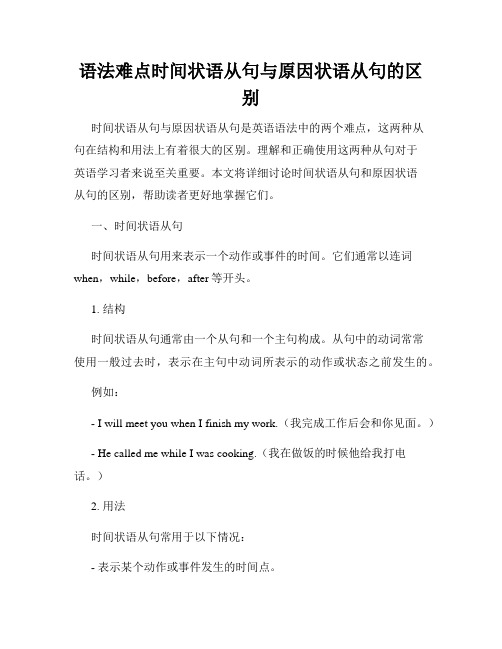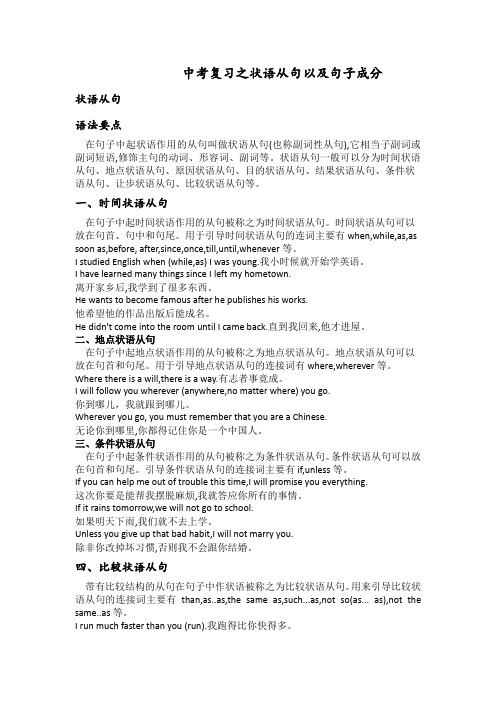时间状语从句和原因状语从句1
英语语法讲解状语从句

Whatever ( = No matter what ) you say, I'll never change my mind.
八、方式状语从句
方式状语从句常由as, as if (though), the way, rather than 等引导。
You can go swimming on condition that ( = if ) you don't go too far away from the river bank.
If he had come a few minutes earlier, he could have seen her.
e.g. He is disappointed because he didn't get the position.
As it is raining, I will not go out.
Now that you mention it, I do remember.
三、地点状语从句
引导地点状语从句的连词是where 和wherever等。 e.g. Sit wherever you like. Make a mark where you have a question.
一、时间状语从句
表示时间的状语从句可由when, as, while, whenever, after, before, till (until), since, once, as soon as (或the moment ), by the time, no sooner …… than, hardly (scarcely) …… when, every time等引导。
中的时间状语从句和原因状语从句的区别

中的时间状语从句和原因状语从句的区别时间状语从句和原因状语从句是汉语语法中常见的两种状语从句。
虽然它们在句法结构上有相似之处,但在表达的意义和用法上有着明显的区别。
时间状语从句是用来表示一个动作或事件发生的时间,它对主句的动作或状态进行时间上的补充或限定。
时间状语从句通常由表示时间的连词引导,如“当”、“一…就”、“每当”、“直到”等等。
这类从句常常出现在主句前或后,并通过连词与主句构成一个完整的复合句。
时间状语从句与主句之间存在着动态关系,它们相互依存,共同构成一个完整的语义单位。
举例来说,我们可以用时间状语从句来表达一个动作或事件发生的时间点或时间段,比如:1. 当我看到那封信时,我感到非常惊讶。
2. 每当我听到这首歌时,我就会想起过去的回忆。
3. 我一回到家就开始做作业。
在以上的例子中,时间状语从句分别使用了连词“当”、“每当”、“一…就”,表示了主句中的动作是在从句中所描述的时间发生或持续的情况下进行的。
与此相反,原因状语从句用来表示某个动作或状态的原因或缘由。
它对主句的动作或状态进行解释、说明或解答。
原因状语从句通常由表示原因的连词引导,如“因为”、“由于”、“所以”、“如果”等等。
原因状语从句通常出现在主句之前,有时也可以出现在主句之后,而且与主句之间有一定的逻辑关系。
举例来说,我们可以用原因状语从句来解释一个动作或状态发生的原因,比如:1. 我没有去参加聚会,因为我生病了。
2. 他父母不同意他出国留学,所以他必须放弃这个计划。
3. 如果明天下雨,我们就不去郊游了。
在以上的例子中,原因状语从句分别使用了连词“因为”、“所以”、“如果”,它们解释了主句中的动作或状态的原因或缘由。
总结来说,时间状语从句和原因状语从句在语法结构上相似,都是用来对主句中的动作或状态进行补充或解释。
然而,它们的区别在于时间状语从句表示了一个动作或事件发生的时间,而原因状语从句则表示了一个动作或状态发生的原因或缘由。
状语从句的种类连词时态

状语从句的种类连词时态状语从句是指用来修饰主句的从句,它可以表示时间、地点、原因、条件、方式、目的等。
在状语从句中,连词的选择和时态的运用非常重要,下面就让我们来详细了解一下状语从句的种类、连词和时态。
一、时间状语从句时间状语从句是表示时间关系的从句,用来修饰主句中的时间概念。
时间状语从句的常用的连词有when,while,before,after,as soon as,until,since,等等。
这些连词所引导的时间状语从句的谓语动词的时态要根据主句的时态而定。
1. 当主句是一般现在时,时间状语从句的谓语动词的时态为一般过去时。
例如:When I was young, I used to play tennis.As soon as he finished his homework, he went to bed.2. 当主句是一般过去时,时间状语从句的谓语动词的时态为过去完成时。
例如:I had finished my homework before I watched TV.After I had dinner, I went to bed.3. 当主句是将来时,时间状语从句的谓语动词的时态为一般现在时或将来时。
例如:I will call you as soon as I arrive in Shanghai.He will stay in New York until he finds a job.二、地点状语从句地点状语从句是表示地点关系的从句,用来修饰主句中的地点概念。
地点状语从句的常用的连词有where,wherever,等等。
这些连词所引导的地点状语从句的谓语动词的时态一般和主句保持一致。
例如:I will meet you where we agreed.Wherever you go, I will follow you.三、原因状语从句原因状语从句是表示原因关系的从句,用来修饰主句中的原因概念。
语法难点时间状语从句与原因状语从句的区别

语法难点时间状语从句与原因状语从句的区别时间状语从句与原因状语从句是英语语法中的两个难点,这两种从句在结构和用法上有着很大的区别。
理解和正确使用这两种从句对于英语学习者来说至关重要。
本文将详细讨论时间状语从句和原因状语从句的区别,帮助读者更好地掌握它们。
一、时间状语从句时间状语从句用来表示一个动作或事件的时间。
它们通常以连词when,while,before,after等开头。
1. 结构时间状语从句通常由一个从句和一个主句构成。
从句中的动词常常使用一般过去时,表示在主句中动词所表示的动作或状态之前发生的。
例如:- I will meet you when I finish my work.(我完成工作后会和你见面。
)- He called me while I was cooking.(我在做饭的时候他给我打电话。
)2. 用法时间状语从句常用于以下情况:- 表示某个动作或事件发生的时间点。
- 表示两个同时发生的动作或事件。
- 表示一个动作或事件发生的原因。
例如:- She always wakes up early when the sun rises.(太阳升起时,她总是早早醒来。
)- We were having dinner while it started to rain.(下雨的时候我们正在吃饭。
)- He missed the bus because he woke up late.(因为他起得晚,所以错过了公交车。
)二、原因状语从句原因状语从句用来表示引起一个动作或事件的原因。
它们通常以连词because,since,as等开头。
1. 结构原因状语从句也是由一个从句和一个主句构成。
从句中的动词通常使用一般现在时,表示主句中动词所表示的动作或状态的原因。
例如:- I couldn't sleep because it was too noisy.(因为太吵了,所以我睡不着。
)- Since you are here, let's start the meeting.(既然你在这里,我们就开始开会吧。
2023年牛津译林版英语中考复习之状语从句以及句子成分讲义(1)

中考复习之状语从句以及句子成分状语从句语法要点在句子中起状语作用的从句叫做状语从句(也称副词性从句),它相当子副词或副词短语,修饰主句的动词、形容词、副词等。
状语从句一般可以分为时间状语从句、地点状语从句、原因状语从句、目的状语从句、结果状语从句、条件状语从句、让步状语从句、比较状语从句等。
一、时间状语从句在句子中起时间状语作用的从句被称之为时间状语从句。
时间状语从句可以放在句首、句中和句尾。
用于引导时间状语从句的连词主要有when,while,as,as soon as,before, after,since,once,till,until,whenever等。
I studied English when (while,as) I was young.我小时候就开始学英语。
I have learned many things since I left my hometown.离开家乡后,我学到了很多东西。
He wants to become famous after he publishes his works.他希望他的作品出版后能成名。
He didn't come into the room until I came back.直到我回来,他才进屋。
二、地点状语从句在句子中起地点状语作用的从句被称之为地点状语从句。
地点状语从句可以放在句首和句尾。
用于引导地点状语从句的连接词有where,wherever等。
Where there is a will,there is a way.有志者事竟成。
I will follow you wherever (anywhere,no matter where) you go.你到哪儿,我就跟到哪儿。
Wherever you go, you must remember that you are a Chinese.无论你到哪里,你都得记住你是一个中国人。
状语从句(高一)

He will not join us unless he changes his mind. Don’t trouble trouble unless trouble troubles you.
*注: 主从句的动作发生在将来时,则主句用将来时,
从句用一般现在时。(主将从现) e.g: If he arrives tomorrow, I will be waiting for him at the airport.
5.目的状语从句
引导目的状语从句的主要连词有: so that, in order that
(so) that --- 以便, 从句中常常使用一些情态动词,如:
can, could, may, might, should等 e.g: Let’s take the front seats (so) that we may see more clearly.
6.让步状语从句
引导让步状语从句的连词有:Although, though
*注:不能与but连用
Although, though ---虽然 although 和though 可以互换,
但although 常放在句首。
e.g: Although it was raining, the plane managed to take off.
e.g: As he is honest and modest, all his friends like him.
Since ---既然 因语气较弱, 常译为既然
e.g: Since everybody has come, we can set off. Since the purser(事务长) didn’t tell us what to do,
初中状语从句

初中英语知识点归纳:状语从句一时间状语从句1.时间状语从句表示时间,引导词有:when, while, as, till, until before, after, since等。
时间状语从句的引导词所表示的意思不尽相同,要注意把握不同引导词所表示的不同时间关系,以及它在具体句子中对应的时态、语态等问题。
注意:as(在……时候,因为),since(自从,因为),它们可以引导时间从句,并强调主句和从句的动作同事发生。
并且while有时还可以表示对比。
例如:(1)While my mother was reading the newspaper, I was watching TV.(read是延续性的动词,read和watch同事发生)I like playing football while you like playing basketball.我喜欢踢足球,而你喜欢打篮球。
(对比)(2)when(当……的时候),引导的从句的谓语动词可以是延续性动词,也可以是瞬间动词。
从句动作可与主语动作同事发生,也可在其后发生。
I was reading a book when she came into my room(come是瞬间动词,只能用when引导,不能用while)I often missed my home when(while) I lived in New York.(live是延续性动词,when可用while代替)(3)when和while的区别还在于:while引导的时间状语从句多用于进行时态,而when引导的时间状语从句多用于一般时态。
While they were talking, the bell rang.正在他们谈话的时候,上课铃响了。
(4)as译作“一边……一边”、“随着……”,侧重主句和从句的动作同时发生。
有时可与when,while通用。
We always sing as we walk.我们总是边走边唱。
八种状语从句

八种状语从句状语从句在句中作状语,修饰主句中的动词、形容词和副词等。
按其作用和意义可分为时间、原因、目的、结果、条件、让步、方式、比较八种。
下面对这八种从句的要点加以总结。
一、各类状语从句的引导词及易混词的区别。
1. 时间状语从句1) 引导词(1)表示“当……时候”:when, while, as, whenever(2)表示“一……就……”:as soon as(3)其它:after, before, since, until, by the timeWhenever he comes, he brings a friend. 他每次来都带个朋友。
I want to see him as soon as he arrives. 他一来我就要见他。
I went to bed after I finished my homework. 我做完家庭作业之后才睡觉。
2) 易混引导词when, while, as 的区别when既可指“时间点”,与瞬时动词连用,也可指“时间段”,与延续性动词连用(这时可与while互换)。
如:When he came in, his mother was cooking. 他进来时,他妈妈正在烧饭。
When(While)we were at school, we went to the library every day. 我们在校求学时,每天都到图书馆去。
while 只表示时间段,因此while从句的谓语动词要用延续性动词。
Please don' t talk so loud while others are talking. 别人在工作时,切勿大声讲话。
as 与when 用法相似,但着重强调主句动作与从句动作同时发生,有“随着……”或“一边……一边……”之意。
She sang as she went along. 她边走边唱。
As you get older, you get more knowledge.随着年龄的增长,你获得的知识就越多。
- 1、下载文档前请自行甄别文档内容的完整性,平台不提供额外的编辑、内容补充、找答案等附加服务。
- 2、"仅部分预览"的文档,不可在线预览部分如存在完整性等问题,可反馈申请退款(可完整预览的文档不适用该条件!)。
- 3、如文档侵犯您的权益,请联系客服反馈,我们会尽快为您处理(人工客服工作时间:9:00-18:30)。
时间状语从句和原因状语从句
I. 选最佳答案
1. I learnt her hard-working and kind _______ I got to know her in the bookstore.
A. first time
B. for the first time
C. the first time
D. by the first time
2. It was not _______ he took off his dark glass I realize who he was.
A. when; that
B. until; when
C. when; then
D. until; that
3.It was 19 years _______ Mandela, the former president of South Africa, was set free from prison.
A. before
B. since
C. until
D. that
4. _______ had the bell rung _______ the students took their seats.
A. Hardly; when
B. No sooner; when
C. Hardly; than
D. No sooner; then
5. We walked along the beach for nearly three hours _______ we saw a boat on the sea.
A. when
B. before
C. unless
D. until
6. The two brothers quarreled and quarreled _______ they felt sleepy and went to bed.
A. when
B. before
C. unless
D. until
7. —What was the party like?
—Wonderful. It’s years _______ I enjoyed myself so much.
A. after
B. before
C. when
D. since
8. It was quite a long time _______ I made it out what had happened.
A. after
B. before
C. when
D. since
9. _______, he went upstairs to sleep without supper.
A. He was tired
B. As he was tired
C. Tired as was he
D. As tired as he was
10. We sent the injured to the First-aid Centre_______ the accident happened.
A. immediately
B. hurriedly
C. quickly
D. shortly
II. 填最适连词
11. She looks unhappy recently _______ her demand has been turned down by her boss.
12. _______ times have changed, good revolutionary traditions can’t be thrown away.
13. _______ all the world were against me, I should still hold to my opinion.
14. _______ she got the pay, she put it away in the bank.
15. I was wandering through t he street _______ I caught sight of a tailor’s shop.
16. He was drinking juice _______ the rest of us drank whisky.
17. _______ you read the poem a second time, the meaning will become clearer to you.
18. We walked along the seaside about two hours _______ we came to a fisherman’s village.
19. The sailor stayed on the lonely island ____ a ship passed there and saved him.
20. It was eight years_______ the Chinese people drove off the Japanese aggressors.。
